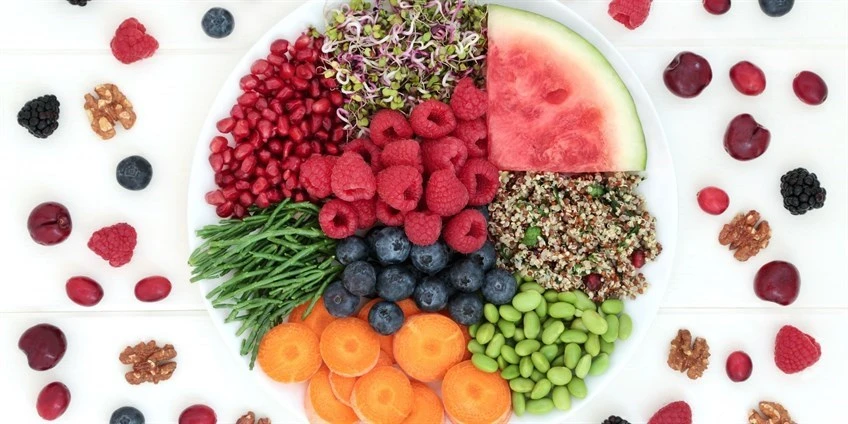What are superfoods?
Superfoods are nutrient dense foods that are beneficial to health, for disease prevention, strengthening the immune system, protecting cells from damage and inflammation and provide a delicious source of antioxidants. They provide a nutrient powerhouse of vitamins and minerals.
A wide range of superfoods are available to us all. Beyond the standard foods available from our supermarkets, look further and aim to ‘eat a rainbow’ of nutrient dense foods, by including superfoods in your diet every single day. This is easier to achieve than it appears, as we are actually surrounded by readily available superfoods. There are far too many to list here. Here are some examples, following the rainbow principle:
- Red: Raspberries – eating one cup of fresh raspberries provides 54% of our vitamin C needs, a high amount of vitamin K, folate, vitamin E, iron, manganese, B vitamins and potassium, high in antioxidants.
- Orange: Butternut squash – high in Omega 3, high in beta-carotene, a natural anti-inflammatory, that naturally converts to provide vitamin A, also high in vitamin C. Also oranges, of course! They contain high levels of vitamin C, vitamin A, antioxidants, flavonoids, potassium, calcium and magnesium. Orange peel or zest contains high levels of calcium, copper, magnesium, vitamin A, folate, B vitamins, use grated in all types of recipes.
- Yellow: Bee pollen – food of the young bee and it is approximately 40% protein. It is considered one of nature’s most completely nourishing foods. It contains nearly all nutrients required by humans. About half of its protein is in the form of free amino acids that are ready to be used directly by the body. It is considered one of nature’s most completely nourishing foods as it contains nearly all nutrients required by humans. Bee-gathered pollens are rich in proteins (approximately 40% protein), free amino acids and vitamins, including the B-complex, and folic acid.
- Green: Leafy green vegetables – spinach, watercress and rocket salads. All green vegetables contain chlorophyll (giving the lovely green colour), are essential to our digestive health and are nutrient dense. Uncooked cabbage contains 50% higher levels of vitamin C than cooked cabbage! Make your own coleslaw for a nutrient dense vitamin packed lunch. Include cabbage, cauliflower, brussels sprouts, kale, and broccoli in your diet often. Remember, a cup of Green Tea daily provides polyphenols, including flavonoids and catechins, powerful antioxidants.
- Blue: Blueberries contain high levels of resveratrol, fibre, potassium, folate, vitamin C, vitamin B6, supporting heart health.
- Indigo: Chia seeds are high in zinc, omega 3 and protein. Include these seeds in your diet often. Also Cacao nibs, high in antioxidants and flavonoids, magnesium and potassium, boost mood-elevating serotonin levels.
- Violet: Red or purple cabbage is richer in phytonutrients and antioxidants than paler green cabbage. Cabbage prevents bile from absorbing fat after a meal, supporting lowering of overall cholesterol levels. Purple carrots have a unique colour that reflects their healthy phytochemical constituents. They contain vitamin A and beta-carotene, as in orange coloured carrots, they are also rich in anthocyanins, the same antioxidant compound that give blueberries their distinctive colour and health benefits.
Antioxidants are often referred to in connection with superfoods
Here is a definition: a substance that inhibits oxidation, such as vitamin C or E that removes potentially damaging oxidizing agents and delays some types of cell damage.
Well known antioxidants include vitamin C, vitamin E, and beta carotene, lutein and lycopene, some of the primary antioxidants in our diets. Other examples of antioxidants include selenium and vitamin A, also foods high in vitamin E including nuts, seeds, vegetables, fish oils and whole grains.
Antioxidants are capable of counteracting the damaging effects of oxidation, for disease prevention.
Overcooking vegetables and fruits destroys nutrients, always cook your superfoods lightly or better still, eat raw! Experiment with different superfood nutrient dense recipes, include pea protein powder in smoothies and other recipes, to provide balanced superfood nutrient benefits, high protein, fibre, Omega 3 levels, trace minerals, all essential amino acids and other essential fatty acid nutrients.Ground flaxseed is high in Omega 3, fibre, lignans, phytoestrogens, providing real superfood support to the digestive tract, helping absorption of nutrients.
Try to include as many superfoods as possible in your diet, experiment with using lots of different colours on your plate and aim to eat 20 different foods every week. This will really boost your superfood and nutrient intake!

